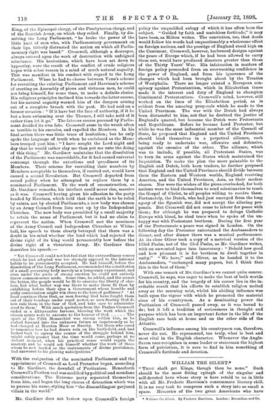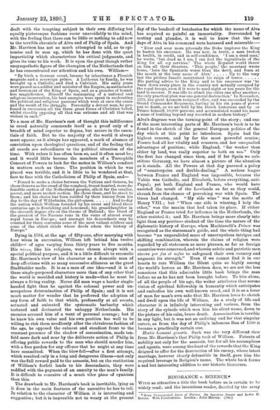WILLIAM THE SILENT.* " THou shalt get Kings, though thou
be none." Such should be the most fitting epitaph of the singular and self-devoted hero whose story is here retold to us in little with all Mr. Frederic Harrison's consummate literary skill. It is no easy task to compress such a story into so small a space. Memories of the two great Americans who have
• William the Silent. By Frederic Harrison. London : Macmillan and Co.
dealt with the tempting subject in their own differing but equally picturesque fashions recur unavoidably to the mind, with the feeling that there can be little or nothing to add now to the terrible chronicle of Alva and of Philip of Spain. And Mr. Harrison has not so much attempted to add, as to epi- tomise and to sum up, which he has done with the quiet impartiality which characterises his critical judgments, and gives its tone to his work. It is upon the great though rather unsympathetic figure of the champion of the Netherlands that he has concentrated our attention and his own. William-
" By birth a German count, became by inheritance a Flemish magnate and a sovereign prince. A Lutheran by family, he was brought up a Catholic, and died a Calvinist. His early years were passed as a soldier and minister of the Empire, as ambassador and lieutenant of the King of Spain, and as a grandee of bound- less magnificence. Himself the mainspring of a national and religious insurrection, his best energies were spent in moderating the political and religious passions which were at once the cause and the result of the struggle. Personally a devout man, he pro- fessed in succession all the three great forms of Christian belief, whilst steadily opposing all that was extreme and all that was violent in each."
To a man of Mr. Harrison's cast of thought this indifference to creed naturally commends itself as a proof only of a breadth of mind superior to dogma, but secure in the essen- tials of faith. But to the majority of the world it always must appear, as it always has appeared, a mark of absence of conviction upon theological questions, and of the feeling that all creeds are subordinate to the political situation of the time. With rulers it has often been so, and it often must be; and it would little become the members of a Turcophile Concert of Powers to look for the motes in William's conduct in matters such as these. The position in which he was placed was terrible, and it is little to be wondered at that face to face with the Catholicism of Philip of Spain, and-
" Forced to make a choice between the Vatican and Geneva, he chose Geneva as the creed of the roughest, truest-hearted, more de- fensible section of the Netherland peoples, albeit far the smaller, poorer, and more modest section. He chose them, and he stuck to them ; and his choice has been ratified by their history from his
day to the day of Wilhelmina, the girl-queen And to-day the nation which William founded by his sweat and blood three centuries ago is flourishing and honoured; his granddaughter in the eleventh degree sits on the throne of Holland ; the blood of the greatest of the Nassaus runs in the veins of almost every royal house in Europe ; and amongst his descendants may be counted for three centuries some of the most valiant soldiers and some of the ablest chiefs whose deeds adorn the history of Europe."
Dying in 1584, at the age of fifty-one, after marrying with four wives in succession, William left behind him twelve children of ages varying from thirty years to five months.
His wives, like his religions, were chosen always with a special political purpose, and it is a little difficult to reconcile
Mr. Harrison's view of his character as a domestic man of deep affections with so many successive alliances as the great Stadtholder made. It is as a man of one idea—and it is of these single-purposed characters more than of any other that the world is moulded and history is made—that he must be always a living reality. Never did man wage a harder single- handed fight than he against the colossal power and un- scrupulous determination of Philip of Spain; and it is not much matter for wonder that he preferred the adoption of any form of faith to that which, professedly at all events, actuated and animated the systematic barbarity which tortured and decimated the unhappy Netherlands. His enemies accused him of a want of personal courage; but if he knew his own value and his own position too well to be willing to risk them needlessly after the chivalrous fashion of the age, he opposed the calmest and steadiest front to the constant presence of the shadow of assassination, made ten- fold more dark and near by the deliberate action of Philip in offering public rewards to the man who should murder him, with a free pardon for any offence that he might at any time • have committed. When the blow fell—after a first attempt, which resulted only in a long and dangerous illness—not only was the full reward paid to the assassin, but on the restitution of William's forfeit lands to his descendants, they were saddled with the payment of an annuity to the man's family.
It is difficult to conceive of a much viler piece of cynicism than this.
The drawback to Mr. Harrison's book is inevitable, lying as it does in the main features of the narrative he has to tell. In relation to the character of William it is interesting and suggestive; but it is impossible not to weary at the present
day of the beadroll of butcheries for which the name of Alva has acquired so painful an immortality. Surrounded by mutiny and plunder, it is well to know that the last
days of Alva in his command were harassed and miserable :— " Ever and ever more piteously the Duke implores the King to hasten his successor. He was now, in truth, a man broken in health, in credit, and in self-confidence. ' I am a dead man,' he wrote, but dead as I am, I can feel the ingratitude of the King for all my services.' The whole Royalist world threw on him all their disasters. 'This people,' the secretary wrote home, hate the Spaniards worse than the devil, and foam at
the mouth at the very name of Alva.' lip to the very last the pitiless fanatic maintained his reign of terror
His parting advice to the King and to his successor was to burn down every place in the country not actually occupied by the royal troops, even if it were to need eight or ten years for the land to recover. It was idle to attack the cities one after another ; the only practical plan was one general destruction.' In November, 1573, the great Assassin resigned office, and was succeeded by the Grand Commander Requesens, having in his six years of power put to death, as we are told by the Dutch historians and by Prince himself, 18,000 persons, and accumulated round his name a mass of loathing beyond any recorded in modern history."
Alva's disgrace was the turning-point of the story ; and one of the most interesting parts of Mr. Harrison's book is to be found in the sketch of the general European politics of the day which at this point he introduces. Spain had the highest renown, and by far the most powerful armies; France had all her vitality and resource, and her unequalled advantages of position; while England, "far weaker than either by land, was really superior to both on sea." Only the first has changed since then, and if for Spain we sub- stitute Germany, we have almost a picture of the situation as it stands. All the Powers at that day pursued a policy of "counterpoise and double-dealing." A serious league between France and England was impossible, because the Valois was Catholic, and Elizabeth, before everything, anti- Papal; yet both England and France, who would have assisted the revolt of the Lowlands as far as they could, shrank from the chance of provoking war with Spain. The times had changed. "My side wins" WBA the motto of Henry VIII.; but "When one side is winning, I help the other," was the maxim that had taken its place. If either England or France tried for influence in the Netherlands, the other resisted it; and Mr. Harrison brings more clearly into
light than any previous student of the time the nature of the diplomatic history of Europe, when Machiavelli's Prince was recognised as the statesman's guide, and the whole thing had become "an unparalleled maze of unscrupulous intrigue and shifting combination, wherein the claims of religion were regarded by all statesmen as mere phrases, so far as foreign countries were concerned, and wherein subtle and patriotic men strove per fas at nefas to safeguard their own country and augment its strength." Even if we cannot find it in our hearts to rate William the Silent quite so highly among the world's heroes as Mr. Harrison does, we are not the less conscious that this admirable little book brings the man before us as he has not been brought before. To him alone, of all the people of his age, the writer attributes that serene vision of spiritual fellowship in humanity which anticipates and embodies his own well-known creed, and it is as a lover of man for man's own sake that Mr. Harrison loves to sketch and dwell upon the life of William. As a study of life and character it is infinitely interesting and various, from the story of the episode which won him his silent name, down to the picture of his calm, brave death. Assassination is terrible in any light, but it was not an unfitting end for that singular career, as from the day of Philip's infamous Ban of 1580 it
became a practically certain one.
Hostig huntani genes-is. Such was the very different view
front Mr. Harrison's that Philip took of William. Patents of nobility not only for the assassin, but for all his accomplices and agents, were among the least of the rewards that the Kink deigned to offer for the destruction of his enemy, whose latest marriage, however clearly defensible in itself, gave him the
required leverage in Religion's name. The whole book forms a sad but interesting addition to our historic literature.







































 Previous page
Previous page